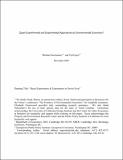Quasi-experimental and experimental approaches to environmental economics
Author(s)
Greenstone, Michael; Gayer, Ted
Downloadgreenstone and gayer quasi-experimental and experimental approaches to environmental economics 011008.pdf (419.2Kb)
PUBLISHER_POLICY
Publisher Policy
Article is made available in accordance with the publisher's policy and may be subject to US copyright law. Please refer to the publisher's site for terms of use.
Terms of use
Metadata
Show full item recordAbstract
This paper argues that an increased application of quasi-experimental and experimental techniques will improve understanding about core environmental economics questions. This argument is supported by a review of the limitations of associational evidence in assessing causal hypotheses. The paper also discusses the benefits of experiments and quasi-experiments, outlines some quasi-experimental methods, and highlights threats to their validity. It then illustrates the quasi-experimental method by assessing the validity of a quasi-experiment that aims to estimate the impact of the Endangered Species Act on property markets in North Carolina. The paper's larger argument is that greater application of experimental and quasi-experimental techniques can identify efficient policies that increase social welfare.
Date issued
2009-01Department
Massachusetts Institute of Technology. Department of EconomicsJournal
Journal of Environmental Economics and Management
Publisher
Elsevier
Citation
Greenstone, Michael, and Ted Gayer. “Quasi-experimental and experimental approaches to environmental economics.” Journal of Environmental Economics and Management 57.1 (2009): 21-44.
Version: Author's final manuscript
ISSN
0095-0696